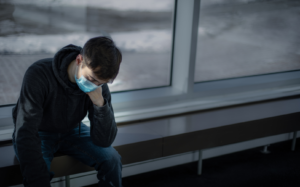The Persisting Effects of the Pandemic on Students
Since March 2020, life has taken an unexpected detour. The pandemic changed everything; from how we gather to how the way we go about our daily lives. Among those most affected are our students. Beyond the challenges we witnessed during distance learning, like the digital divide and the lack of space to learn at home, this year our students continue to feel the weight of the pandemic even as they return to in-person learning.

While returning to school meant a return to ‘normalcy’ for some, many of our students are still confronted with the fallout of COVID-19. Their communities have been amongst the hardest hit, with the highest rates of loved ones lost. People most affected by job loss were those without a college degree, and with 76% of our students being first-generation college-goers, that meant their households were disproportionately affected by this phenomenon.
Earlier this year, Leo*, a student in our College Access Program, lost his father to COVID. It was a devastating moment for his family, who grieved their loss in confinement due to their own illnesses. His father was the sole breadwinner of the household and instead of looking at colleges, Leo spent a good part of his last semester as a high school junior helping his mother navigate their family through potential eviction from their home. Luckily, they were able to stay in their home due to the moratorium, but as restrictions begin to change, their future is once again uncertain. Leo is a high-achieving student who once had plans to attend an East Coast college, but is now considering staying local for college so he can help his mom make ends meet and support his family.
Many of our high school students already faced financial barriers to getting to college, and that has only intensified. More students are missing out on much-needed workshops that will help them navigate the admission and financial aid process because they are having to work to help support their families being affected by job loss. Bianca*, who is now a senior, told her Fulfillment Fund Counselor that she had to take a job because her parents, who had been setting money aside for her education, will no longer afford to help her pay for college. She is doing everything she can to make her future education happen. While Bianca goes to work after school, her counselor is helping her find creative solutions to her new financial gap.
Overall, our College Counselors working with our high schoolers are seeing the effects of the pandemic across the board. Getting to college seems like a longer road than ever before. Learning loss is real in our community, and lower grades mean it is not only harder to get into college, but it also lowers your ability to pay for it. Students are more unsure about their paths and future careers. During normal years, we were able to take students to visit colleges and find their best fit from these experiences; few have been able to do this distance learning. Counselors also reported that, more than ever, students need to stay closer to home, either to help with financial responsibilities or because now they simply cannot afford the cost of living outside their family home.
Working with our college students, our College Success team has seen a deterioration of students’ mental health, particularly amongst lower classmen. Jessica’s* entire family was affected by COVID and lost loved ones. After an extended leave of absence, she is now entering her second year, but her return to school has been difficult. Jessica is having a hard time readjusting to learning in person and being in the school setting. She has been able to connect with her Fulfillment Fund College Advisor frequently about troubles with school and just to vent about some of the issues she faces. She has been struggling with motivation and her overall mental health, which is affecting her academic performance. Like Jessica, many of our students have felt comfortable enough to tell their Fulfillment Fund Advisors that they need support for their mental health, which is why we have been conducting regular wellness checks with our college students.
 Kevin’s* mom lost her job, and because she is an undocumented immigrant, she has struggled to find work. He had to take time off school to move home and support his family through hard times by getting a full-time job. Thankfully this year, his mom found work and he was able to return to school this semester. Kevin picked up two part-time jobs to continue to help his family and support himself through school. He is also active in extracurricular activities, and while he is seemingly doing well, he is concerned that he will burn out as he has no time for self-care. Academically, both Kevin and Jessica took an intensive summer semester and are on track to graduate. We are extremely proud of them and their resilience.
Kevin’s* mom lost her job, and because she is an undocumented immigrant, she has struggled to find work. He had to take time off school to move home and support his family through hard times by getting a full-time job. Thankfully this year, his mom found work and he was able to return to school this semester. Kevin picked up two part-time jobs to continue to help his family and support himself through school. He is also active in extracurricular activities, and while he is seemingly doing well, he is concerned that he will burn out as he has no time for self-care. Academically, both Kevin and Jessica took an intensive summer semester and are on track to graduate. We are extremely proud of them and their resilience.
Other students, like Emily* and Brian*, have reported that they did not get the financial aid packages they were expecting due to their schools not being prepared for students returning to school; one lost their transcripts while the other is still in limbo. Students are also reaching out to our Advisors because they are not able to enroll in the classes they need to graduate. Others tell us they are just having a hard time coping with being back on campus and feel overwhelmed, particularly in large group settings. All of this is also making it so much harder for students to connect and build community, and to persist in college.
Jackie* started at a major university in 2020, but virtual learning was just not working for her. She dropped out after her first semester because she felt it was not the right experience. Luckily, she stayed in touch with her Advisor who suggested she enroll in a community college as an alternative. Over the last six months, the two worked tirelessly to meet the deadlines and get Jackie ready to go back to school. Now, Jackie is getting ready to start in the winter term and continue to pursue her degree.
Even though our students are excited to get back to ‘normal’, their home life is anything but that; their families are still facing illness and job loss. While many are surfacing feelings of betrayal by their institutions, we are doing our best to fill those gaps and provide them with the support they need to succeed. On the bright side, our students are resilient and vocal about their mental health needs, which have given us the ability to shift and support them the way they need us to on this road.
*Names changed for privacy